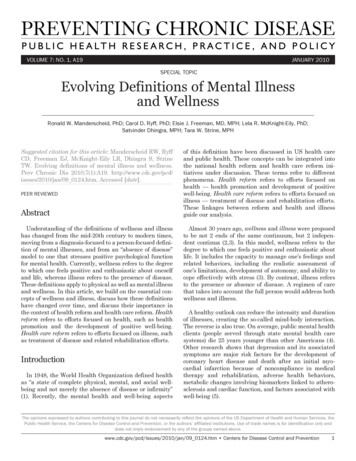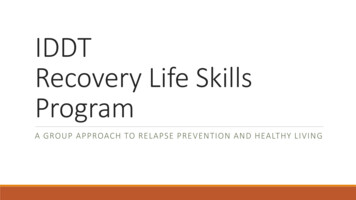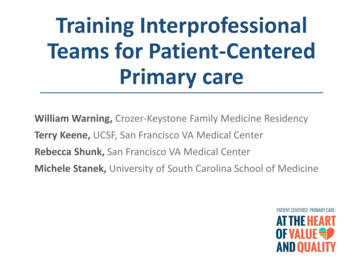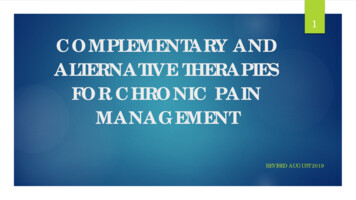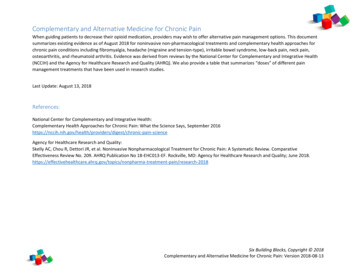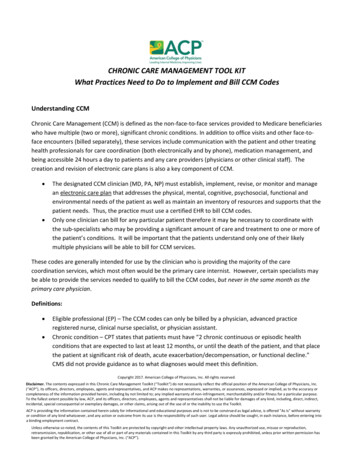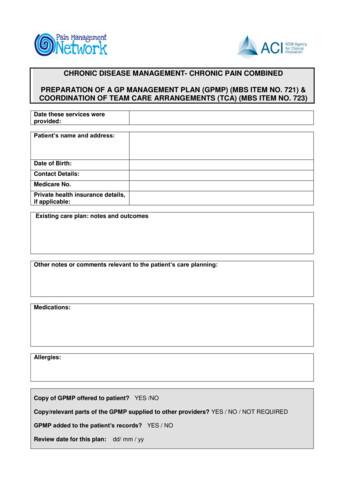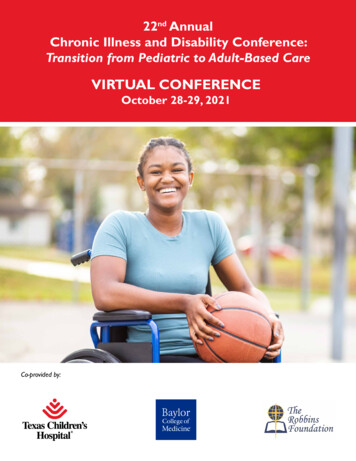
Transcription
22nd AnnualChronic Illness and Disability Conference:Transition from Pediatric to Adult-Based CareVIRTUAL CONFERENCEOctober 28-29, 2021Co-provided by:
PLANNING COMMITTEEAlbert C. Hergenroeder, MD – Activity DirectorCecily L. Betz, PhD, RN, FAANJackie Czyzia, MPHAmanda Garey, MSN, RNC-OB, C-EFMScott Garner, MBAIvy GoldsteinAlbert C. Hergenroeder, MDElaine HimeSiripoom McKay, MDPeggy McManus, MHSDiane Murrell, LMSWDiane Scardino, MBA, MHA, FACHEShelley Townsend, MSWSherry Vinson, MDLaura WarrenChava White, LMSW-APAudrey Young, MPHACTIVITY FACULTYAll faculty are located in Houston, Texas, unless otherwise noted.Chadi Calarge, MDProfessor of Psychiatry,Baylor College of MedicineCatherine Gordon, MD, MSChair, Department of Pediatrics,Baylor College of MedicineDeena Chisolm, PhDDirector, Center for Child Health Equity andOutcomes Research, Abigail Wexner Research Institute,Nationwide Children’s HospitalAndy HardwickPublic Affairs Specialist,Social Security Administration, Area IIIAssociate Professor of Pediatrics, Ohio State UniversityCollege of Medicine and Public HealthColumbus, OhioMary Ciccarelli, MDProfessor of Clinical Medicine and Pediatrics,University of Indiana School of Medicine,Indianapolis, IndianaKristin Cleverly, RN, PhDCAMH Chair, Mental Health NursingAssistant Professor, University of TorontoToronto, OntarioMark Del Monte, JDCEO, American Academy of PediatricsWashington, DCSusan Fernbach, RN, BSNAssistant Professor, Department Molecularand Human Genetics,Baylor College of MedicineBeth Garland, PhDAssociate Professor of Pediatrics,Section of Adolescent Medicine and Sports Medicine,Baylor College of Medicine, Department of PediatricsColleen Horton, MPAffDirector of Policy, Hogg Foundation for Mental Health,The University of Texas at Austin,Division of Diversity and Community EngagementAustin, TexasPeggy McManus, MHSCo-Project Director, Got TransitionWashington, DCBeth Sufian, JDPartner, Sufian & PassamanoTiphanie Vogel, MD, PhDAssistant Professor, Section of Rheumatology,Rheumatology Transition Program,Baylor College of MedicineKaren Weigle, PhDLicensed PsychologistAssociate Director, The Center for START Servicesat the University of New Hampshire Instituteon DisabilityConcord, New HampshireBrynne Willis, M.Sc.Research Assistant, JD/MBA Candidate,Case Western Reserve University School of LawCleveland, Ohio
NEEDS STATEMENTSkill preparation and planning for healthcare transition for children and youth with special healthcare needs is inadequate.Less than fifty percent of families nationwide indicate that their children with special healthcare needs have received theservices necessary to make appropriate transitions to adult healthcare, work, and independence. One of the major hurdles toreceiving this care is the lack of a workforce, including physicians, nurses, social workers, mental health providers and all whoprovide services to youth and young adults with special healthcare needs trained to provide the services necessary to make thehealthcare transition. There is a strong need for physicians to have the knowledge and skills to provide the services needed tofacilitate a successful transition from pediatric to adult-based care and services.Because of increased awareness of transitioning to adult-based care, clinicians are required to update their knowledge of thechanging strategies for integrating emerging adult-based care into practice.For all conference participants, there will be a discussion of the legal issues involved in healthcare transition, as well as timeto meet and talk with faculty in small groups, to exchange ideas among participants, and to share knowledge and informationabout how best to plan for a successful transition to adulthood.TARGET AUDIENCEPhysicians in internal medicine, family practice, pediatrics, psychiatry, and physiatry; other healthcare providers includingpsychologists, social workers, nurses, dietitians, case managers, counselors, and primary care providers; and youth and youngadults who have a chronic illness or disability and their parents or guardians.LEARNING OBJECTIVESAt the conclusion of the conference, participants should be able to: Describe the legal and ethical issues involved in HCT for adolescents and young adults with special health care needs. Discuss payment challenges and options for HCT services. Implement advances in HCT services for adolescents and young adults with psychiatric illness. Outline an example of the structure, processes, evaluation and outcomes of a sub-specialty transition program basedin a large children’s hospital.EDUCATIONAL METHODSLectures Small Group Breakout Sessions Question and Answer Sessions Audience Response System Role PlayACTIVITY EVALUATIONEvaluation by questionnaire will address program content, presentation, and possible bias.ACCREDITATION/CREDIT DESIGNATIONPhysiciansBaylor College of Medicine is accredited by the Accreditation Council for Continuing Medical Education (ACCME) to providecontinuing medical education for physicians.Baylor College of Medicine designates this live activity for a maximum of 12.50 AMA PRA Category 1 Credits . Physiciansshould claim only the credit commensurate with the extent of their participation in the activity.The presentation, Legal Issues in the Transition from Pediatric to Adult-Based Care, has been designated by BaylorCollege of Medicine for 1.0 credit of education in medical ethics and/or professional responsibility.Social WorkTexas Children’s Hospital is an approved continuing education provider for Social Workers through the Texas State Boardof Social Worker Examiners. Social work continuing education units provided, 12.50 hours of continuing education including0.75 hour of ethics.
NursingTexas Children’s Hospital is accredited with distinction as a provider of nursing continuing professional development by theAmerican Nurses Credentialing Center’s Commission on Accreditation. This continuing nursing education activity awards upto 12.50 contact hours.This nursing continuing professional development activity awards up to 12.50 contact hours.This includes 1.0 out of the 2.0 contact hours required for Nursing Jurisprudence and Ethics Continuing NursingEducation Requirement.Occupational Therapy and Physical TherapyThis activity has been approved by the Texas Board of Physical Therapy Examiners for 12.50 CCUs for PTs and PTAs.Continuing Competency Units (CCU) have been applied for this conference through Texas Occupational Therapy Association(TOTA) 12.50 hours credit. Texas Children’s Hospital is an Approved Provider for the Texas Occupational TherapyAssociation. The assignment of TOTA CE hours does not imply endorsement of a specific course, content, products, orclinical procedures by TOTA.FEE, REGISTRATION AND CONFIRMATION INFORMATIONRefer to the online registration form at cpd.education.bcm.edu/chronic2021 for the fee schedule. Your registration willnot be processed until payment is received. Your registration will be confirmed. If you have not received confirmation atleast 5 business days before the activity start date, contact the Baylor College of Medicine (BCM) Division of ContinuingProfessional Development (DCPD) immediately.A limited number of scholarships are available for adolescents and young adults with special health care needs and theirparents or guardians. For complete details, please contact Lauren Warren at laura@txp2p.org.The DCPD reserves the right to limit the number of participants in an activity and will not be responsible for any expensesincurred by an individual whose registration is not confirmed and for whom space is not available.To register/pay for the conference, visit our website at UND POLICYRequests for registration refunds must be in writing and received by the DCPD at least 10 business days before the activitybegins. The date the request is received by the DCPD will be considered the cancellation date. Requests received after therefund deadline will not be processed. Cancellations are subject to a 50 administrative fee to be deducted from the paidregistration fee to cover guarantees and other expenses. Requests should be emailed to cpd@bcm.edu.The DCPD reserves the right to cancel activities, not less than 10 business days before the scheduled date, if extenuatingcircumstances make it necessary. Registrants will be notified at the contact number indicated on the registration form andagain in writing. If an activity is cancelled, the DCPD’s liability is limited to the paid registration fee. Note: If the registrationpayment was made by check, a Social Security number is required to process the refund.
22nd Annual Chronic Illness and Disability Conference:Transition from Pediatric to Adult-Based CareAG E N DATHURSDAY, OCTOBER 28, 202110:00 Advocacy for Adolescent Access to CareMark Del Monte, JDCEO, American Academy of Pediatrics7:50 a.m. Waiting Room (Zoom)Goal: (TBD)Objective: (TBD)8:00 Welcome and AnnouncementsAlbert C. Hergenroeder, MD10:458:10 Introduction and WelcomeCatherine Gordon, MDChair, Department of Pediatrics, Baylor College of Medicine11:00 Legal Issues in the Transition From Pediatric toAdult-Based CareBeth Sufian, JDPartner, Sufian & Passamano8:15 Inspirational Video8:25 Houston City Council ProclamationDavid Robinson, Houston City CouncilStephen Williams, Director, Houston Health Department8:35 The State of Health Care Transition (HCT)in 2021Mary Ciccarelli, MDUniversity of Indiana School of MedicineGoal: The audience will understand the state of health caretransition in 2021.Objectives: The audience will: Appreciate the advances that have been made in the fieldpertaining to health care transition science and practice. Gain awareness of the successful strategies that havecontributed to the development of health care transitionscience and practice. Understand the future challenges that confront thewidespread implementation of health care transitionservice models. Recognize the unique features of health care transitionfield of science and practice and its potential for effectingimproved outcomes for adolescents and emerging adultswith Special Healthcare Needs (SHCN) and disabilities.9:20 Paying for TransitionPeggy McManus, MHSGot TransitionGoal: The audience will understand the importance ofcurrent payment options for HCT services.Objectives: The audience will be able to describe: Current fee-for-service and value-based paymentstrategies that can be used to support HCT. Quality performance options to align with payment. Applying payment and quality innovations to supporta successful transfer of care.BreakGoal: The audience will be able to understand guardianshipand supportive decision making; and, practical methods ofensuring legally mandated insurance coverage during thehealth care transition.Objective: The audience will be able to discuss health caretransition in the context of the current health care landscape. Guardianship/supportive decision making/powerof attorney. Health insurance and supplemental security income (SSI)non-medical eligibility.11:50 Q&ANoon Lunch12:15 Meet-the-Faculty Lunch Karen Weigle, PhD Mary Ciccarelli, MD Beth Sufian, JD Susan Fernbach, RN, BSN (family speaker) Got Transition1:00 Conclusion of lunch sessions(Continued)
1:20 BREAKOUT SESSIONS I, WITH FACULTYAttendees, please choose from one of the followingsix sessions:IDD, Trauma, and Mental Health:Addressing the Mental Health and Wellness ofAdolescents and Young Adults with IDDColleen Horton, MPAffDirector of Policy, Hogg Foundation for Mental HealthThe University of Texas at Austin, Division of Diversity andCommunity EngagementGoal: To increase our capacity to support individuals withIDD who experience mental health conditions and/or theimpact of trauma.Objectives: The audience will be able to discuss: The need to recognize mental health conditions inindividuals with IDD – it’s not always about “behavior!” The impact of trauma and the importance of creatingtrauma-informed environments. The barriers that exist for individuals with IDD who needmental health treatment. Additional resources to further explore the mental healthof individuals with IDD.Legal IssuesBeth Sufian, JDPartner, Sufian & PassamanoGoal: The audience will be able to understand guardianshipand power of attorney as a teenager transitions intoadulthood.Objectives: The audience will be able to discuss: The difference between guardianship and powerof attorney. The pros and cons of guardianship and powerof attorney from the perspective of the patientand guardian. Health insurances and SSI non-medical eligibility.Targeted Programs to Improve TransitionOutcomes for YA with Psychiatric IllnessKristin Cleverly, RN, PhDCAMH Chair, Mental Health NursingAssistant Professor, University of TorontoToronto, OntarioGoal: (TBD)Objective: (TBD)Social Security InsuranceAndy HardwickPublic Affairs Specialist, Social Security Administration,Area IIIGoal: The audience will understand the importance ofsuccessful application for supplemental security income (SSI)and supplemental security disability insurance (SSDI) benefitsas the young adult transitions into adult-based care.Objective: The audience will be able to describe: The process of applying for these benefits. The timeline for preparing the application. Common reasons why people are turned down intheir application. The types of services these benefits cover.Health Disparities and Health Care TransitionDeena Chisolm, PhDDirector, Center for Child Health Equity and OutcomesResearch; Abigail Wexner Research Institute,Nationwide Children’s Hospital; Associate Professor ofPediatrics, Ohio State University College of Medicine andPublic HealthGoal: The audience will understand the health disparities thatexist in the transition from pediatric to adult-based care foryouth and young adults with special health care need.Objectives: The audience will be able to discuss: The evidence of health disparities during thetransition period. Potential solutions to address these health care disparities.Operation of the START ProgramKaren Weigle, PhDLicensed PsychologistAssociate Director, The Center for START Services (Skills,Trauma, Anxiety, Rehabilitation, and Treatment (START),University of New Hampshire Institute on DisabilityGoal: The audience will understand an overview of theSTART model’s role in systems change, crisis prevention, andcrisis intervention.Objectives: The audience will be able to discuss: Values of the START model. Structure of a START program. Outcomes so far.
2:20 p.m. BREAKOUT SESSIONS II,WITH FACULTYAttendees: please choose from one of the six sessionsoffered from Breakout Sessions I (see previous page).3:05 Break3:20 Improving Mental Health Outcomes forIndividuals with Intellectual Disabilities: What WorksKaren Weigle, PhDLicensed PsychologistAssociate Director, The Center for START Services,University of New Hampshire Institute on DisabilityGoal: The audience will understand the diagnosis andtreatment of mental health conditions in transitioning adultswith IDD.Objective: The audience will be able to: Describe vulnerabilities/common issues associated withtransition from youth to adult mental health care forpeople with IDD in North America and U.K. Describe the START model in the U.S., researchassociated with the model, outcomes, andrecommendations. Describe a guide to promote an integrated approach toadult mental health care available to all participants.4:05 Q&A4:15 Evaluation4:20 AdjournmentAG E N DAFRIDAY, OCTOBER 29, 20217:30 a.m. Waiting Room (Zoom)8:00 AnnouncementsAlbert C. Hergenroeder, MD8:15 Addressing Patient Adherence with MotivationalInterviewing Maybe as a Mental Health TransitionProblemBeth Garland, PhDAssociate Professor of Pediatrics,Section of Adolescent Medicine and Sports Medicine,Department of Pediatrics, Baylor College of MedicineGoal: The audience will understand MI techniques as a wayof addressing non-adherence.Objectives: The audience will be able to discuss: MI techniques they could implement in their practice. How MI could be used to address non-adherence inself-management for Adolescent/Young Adult with specialhealth care needs (AYASHCN) in transition.9:00 Q&A9:10 Young Adult PerspectiveBrynne Willis, M.Sc.Research Assistant, Case Western Reserve School of Law,Cleveland, OhioGoal: The audience would understand how social stigma andchronic grief impact young adults with chronic medical illnesstransitioning from adolescence to young adulthood.Objective: The audience will be able to describe: How social stigma impacts mental health and behaviors inadolescents and young adults during transition The process of chronic grief. How these dynamics are addressed by the medicalcommunity.9:40 Q&A9:55 Break(Continued)
10:05 Anxiety and Depression in the Transition –A Clinical PerspectiveChadi Calarge, MDProfessor of Psychiatry, Baylor College of MedicineGoal: The audience will be able to understand the clinicalcourse of anxiety disorders and major depressive disorderbetween adolescence and young adulthood.Objective: The audience will be able to describe: Evidence-based treatments for Generalized AnxietyDisorder (GAD) and Major Depressive Disorder (MDD)adolescents and young adults. The natural history of GAD and MDD in patientssuccessfully treated with medication and psychotherapy. The interface of anxiety and depressive disorders andother chronic medical illnesses in adolescents andyoung adults.10:50 Transition Advances in the Mental Health FieldKristin Cleverly, PhDSenior Scientist, Margaret and Wallace McCain Centrefor Child, Youth & Family, Mental Health Division;Assistant Professor, Lawrence Bloomberg Faculty of Nursingand Department of Psychiatry, University of TorontoGoal: The audience will understand the current state oftransition from pediatric to adult-based care for adolescentsand young adults with psychiatric illness.Objectives: The audience will be able to describe: The state of transition to adult-based care for youth andyoung adults with psychiatric illness in the United States(international and in U.S.) Models for transition, with outcome data. Educational and career outcomes for patients afterthey transition.11:35 Q&A11:45 Exhibitors and lunch1:00 p.m. Health Literacy and TransitionDeena Chisolm, PhDDirector, Center for Child Health Equity andOutcomes Research; Abigail Wexner Research Institute,Nationwide Children’s HospitalAssociate Professor of Pediatrics, Ohio State University,College of Medicine and Public HealthGoal: The audience will be able to understand theimportance of health literacy in developing transitionreadiness.Objectives: The audience would be able to describe: Methods to assess health literacy. Relationship between health literacy and transitionreadiness. Epidemiology of health illiteracy and its health andeconomic consequences. Methods to improve health literacy.1:45 Q&A1:55 Break2:05 From Stress to StrengthSusan Fernbach, RN, BSNAssistant Professor, Department of Molecular andHuman Genetics, Baylor College of MedicineGoal: Provide the audience methods to improve self-care forCaregivers of teens/young adults with IDD as they transitionto adult care.Objective: The audience will be able to describe a programfor improving self-care for caregivers, including specific tipsgathered from one session. This session includes a briefoverview of the From Stress to Strength program model andqualitative results from the program, as well as specificdiscussion from one session of Positive Adult Developmentcurriculum: “From Conflict to Collaboration.”2:45 The Rheumatology Transition Program at TexasChildren’s Hospital: Structure, Processes and OutcomesTiphanie Vogel, MD, PhDRheumatology Transition Program, Texas Children’s HospitalGoal: The audience will be able to understand the structure,process and outcomes of this transition program.Objectives: The audience will be able to describe thefollowing elements to this transition program and how theyhave developed over several years: The structure The processes The outcomes How data for these metrics were collected3:30 Q&A3:40 Closing Comments/Evaluation
at the University of New Hampshire Institute on Disability Concord, New Hampshire Brynne Willis, M.Sc. Research Assistant, JD/MBA Candidate, Case Western Reserve University School of Law Cleveland, Ohio Cecily L. Betz, PhD, RN, FAAN Jackie Czyzia, MPH Amanda Garey, MSN, RNC-OB, C-EFM Scott Garner, MBA Ivy Goldstein Albert C. Hergenroeder, MD .

